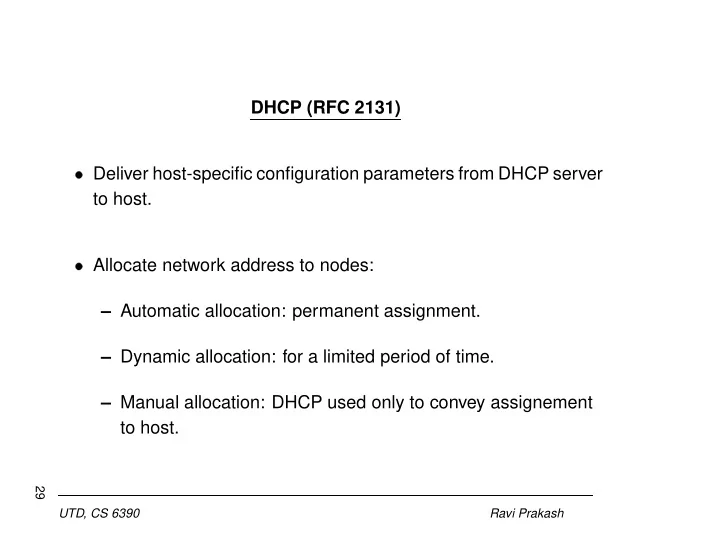

DHCP (RFC 2131) � Deliver host-specific configuration parameters from DHCP server to host. � Allocate network address to nodes: – Automatic allocation: permanent assignment. – Dynamic allocation: for a limited period of time. – Manual allocation: DHCP used only to convey assignement to host. 29 UTD, CS 6390 Ravi Prakash
DHCP Goals � Must ensure address uniqueness in the network. � Must work across routers, or through BOOTP relay agents. � Client must be prepared to receive multiple responses to configuration requests. � Retain client configuration across client and server reboots. 30 UTD, CS 6390 Ravi Prakash
Configuration Parameter Repository � DHCP server stores a (key, value) pair for each client. � Key used to identify a client. � Default key = (IP-subnet number, hardware-address) . What if client changes network card or moves to another subnet? Client can explicitly supply another identifier. 31 UTD, CS 6390 Ravi Prakash
Dynamic Allocation of Network Address � Client requests an address lease for a period of time. � DHCP servers guarantee not to reallocate address during the lease. � Client can extend its lease. � Client can release an address before lease ends. � Servers can choose to granter a shorter lease than requested. 32 UTD, CS 6390 Ravi Prakash
Address Conflict Avoidance � Servers may assign an address previously used by another client (address reuse). � Servers may choose the least recently used address. � Server should perform conflict detection using ICMP echo requests. � Client should probe received address (e.g., with ARP). 33 UTD, CS 6390 Ravi Prakash
Time � Time represented in units of seconds. � 0xFFFFFFFF represents infinite time. � Time always expressed in relation to client’s clock (Why?) � Client lease expiration time = Time when client sent DHCPREQUEST + lease duration in DHCPACK. 34 UTD, CS 6390 Ravi Prakash
Timer Values � T1: default is ation . 0 : 5 l ease dur � � T2: default is ation . 0 : 875 l ease dur � � In RENEWING state: retransmit DHCPREQUEST after half of remaining time until T2. � In REBINDING state: retransmit after half of remaining lease time (minimum = 60 seconds). 35 UTD, CS 6390 Ravi Prakash
DHCP Thread Models (for IPv6) � Rogue server providing incorrect information to client. � Accidentally misconfigured server providing incorrect information. � Invalid client masquerading as valid client. � Denial of Service attack: exhaustion of valid addresses, or exhaustion of CPU or network bandwidth. 36 UTD, CS 6390 Ravi Prakash
Countering DHCP Threats Authentication: optional information helps identify source and confirm integrity of message (e.g., which hash function used). Replay detection: use monotonically increasing counter. Configuration token protocol: matching received token with mutually agreed upon token. Shared secret key: one key per (client, DHCP server) pair (scalability problems). 37 UTD, CS 6390 Ravi Prakash
Recommend
More recommend